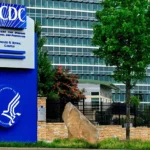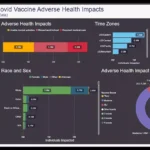🚨The National Academies of Sciences says that "it is now established that the myocarditis comes from the vaccination…one has to say, sadly, that of 100 people who get myocarditis today, something in the range of 20 to 50% will not be among us after 10 years…this is… pic.twitter.com/X4nJzpk8kW
— Sense Receptor (@SenseReceptor) May 1, 2024
A new comprehensive review conducted by the National Academies of Sciences, Engineering, and Medicine has sparked fresh concerns about the safety of COVID-19 vaccinations. The review focuses particularly on the adverse effects of intramuscular vaccine administration. This analysis consolidates a wide range of data sources, including clinical trials and patient reports, to thoroughly understand the potential risks associated with these vaccines.
Shocking Data Reveals 20-50% of Covid Vaccine Recipients Suffer Adverse Effects
The comprehensive review unearthed disturbing statistics, indicating that 20% to 50% of individuals who received COVID-19 vaccines experienced adverse effects. These ranged from mild symptoms, such as fatigue and pain at the injection site, to more severe and life-altering conditions, including myocarditis and neurological disorders.
The high incidence of these reactions starkly contrasts with earlier reports from health authorities and vaccine manufacturers, which significantly underreported these figures. This revelation calls into question the safety protocols and approval processes used in the rapid development and distribution of vaccines, highlighting a potential oversight or underestimation of the risks involved in mass vaccination programs.
Highlighting Key Adverse Effects
The review outlines several significant health concerns associated with the COVID-19 vaccines. Notably, it discusses instances of myocarditis, blood clotting disorders, and severe allergic reactions, which have been reported in a small fraction of vaccine recipients. These findings challenge the prevailing narrative promoted by health authorities and the vaccine industry regarding the vaccines' safety profile.
Questioning Government and Industry Transparency
The release of this report raises serious questions about the transparency and accountability of both government health agencies and the vaccine industry. Critics argue that there has been a concerted effort to downplay or disregard the adverse effects associated with the vaccines, potentially putting public health at risk. The review criticizes the lack of clear communication and inadequate risk assessment disseminated to the public, which has fueled distrust and skepticism toward vaccination campaigns.
Implications for Public Health Policy
The implications of these findings are far-reaching, suggesting that more stringent safety protocols and comprehensive risk evaluations are needed to ensure public trust and vaccine efficacy. The report calls for enhanced surveillance systems to monitor vaccine side effects and more robust regulatory oversight to protect public health while maintaining high vaccination rates crucial for managing the pandemic.
Call for Action
In light of these findings, there is a pressing need for a re-evaluation of vaccine safety protocols and increased transparency from both the government and the pharmaceutical industry. These entities must acknowledge and mitigate the identified risks to prevent further public trust and health harm. This report serves as a crucial check on the powers overseeing vaccine distribution and regulation, urging a more cautious and informed approach.

Carl Riedel is an experienced writer and Open Source Intelligence (OSINT) specialist, known for insightful articles that illuminate underreported issues. Passionate about free speech, he expertly transforms public data into compelling narratives, influencing public discourse.













